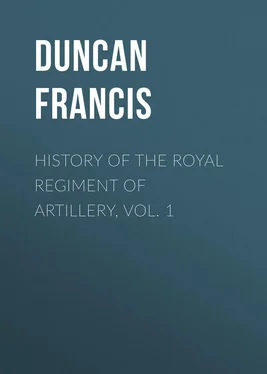Francis Duncan - History of the Royal Regiment of Artillery, Vol. 1
Здесь есть возможность читать онлайн «Francis Duncan - History of the Royal Regiment of Artillery, Vol. 1» — ознакомительный отрывок электронной книги совершенно бесплатно, а после прочтения отрывка купить полную версию. В некоторых случаях можно слушать аудио, скачать через торрент в формате fb2 и присутствует краткое содержание. Жанр: foreign_antique, foreign_prose, на английском языке. Описание произведения, (предисловие) а так же отзывы посетителей доступны на портале библиотеки ЛибКат.
- Название:History of the Royal Regiment of Artillery, Vol. 1
- Автор:
- Жанр:
- Год:неизвестен
- ISBN:нет данных
- Рейтинг книги:4 / 5. Голосов: 1
-
Избранное:Добавить в избранное
- Отзывы:
-
Ваша оценка:
- 80
- 1
- 2
- 3
- 4
- 5
History of the Royal Regiment of Artillery, Vol. 1: краткое содержание, описание и аннотация
Предлагаем к чтению аннотацию, описание, краткое содержание или предисловие (зависит от того, что написал сам автор книги «History of the Royal Regiment of Artillery, Vol. 1»). Если вы не нашли необходимую информацию о книге — напишите в комментариях, мы постараемся отыскать её.
History of the Royal Regiment of Artillery, Vol. 1 — читать онлайн ознакомительный отрывок
Ниже представлен текст книги, разбитый по страницам. Система сохранения места последней прочитанной страницы, позволяет с удобством читать онлайн бесплатно книгу «History of the Royal Regiment of Artillery, Vol. 1», без необходимости каждый раз заново искать на чём Вы остановились. Поставьте закладку, и сможете в любой момент перейти на страницу, на которой закончили чтение.
Интервал:
Закладка:
Francis Duncan
History of the Royal Regiment of Artillery, Vol. 1 / Compiled from the Original Records
PREFACE TO THIRD EDITION
A further reorganization of the Royal Artillery, involving alterations in the nomenclature of Batteries, having taken place since the publication of the Second Edition, the Author has deemed it desirable to issue a Third, with tables added to Appendix C, in the Second Volume, which will enable the reader to keep up the continuity.
These frequent changes are embarrassing to the student of history, but in the present instance the change has been distinctly advantageous in an administrative point of view.
Woolwich. October, 1879.PREFACE TO SECOND EDITION
The unexpected favour accorded to the first edition of this work having already rendered a second necessary, the author has taken the opportunity of making many corrections and additions, and of embodying the indices of both volumes in one. The history, as it now stands, represents the services of the Corps in detail as far as the year 1815, and gives a summary of the services of those batteries now in existence, which represent the troops and companies of the old Royal Horse Artillery, and of the nine senior battalions of the Royal Artillery. The tables at the end of both volumes will also assist the reader in tracing the antecedents of every battery in the Regiment.
The author takes this opportunity of expressing his gratitude to his brother officers for the cordial sympathy and encouragement which he has received from them during his labours, and his hope that the noble narrative commenced by him will not long remain unfinished. The importance of completing the record of the Corps' services in the Crimea and India, while the officers who served in these campaigns are yet alive, is very apparent; and the author would respectfully suggest that any documents throwing light upon these services, which are in the possession of any one belonging to, or interested in the Corps, should be deposited for safe keeping, and for reference, in the Regimental Record Office at Woolwich.
March 2, 1874.PREFACE TO FIRST EDITION
Among the uneducated, discipline is created by fear, and confirmed by habit. Among the educated, the agency at work is more complicated. Sympathy with the machine of which the individual finds himself a part, and a reasoning apprehension of the necessity of discipline, are mingled with a strong feeling of responsibility; and, as in the former case, habit steps in to cement the whole. Of all these agents, the noblest is undoubtedly the sense of responsibility, and the highest duty of a military commander is to awaken this sense where it does not exist, and to confirm and strengthen it where it does.
Two means may be employed to ensure this end. First: let the importance of his duty be impressed on the individual, and let the value in a military sense of what might seem at first sight trivial be carefully demonstrated. Let it be explained that neglect of some seemingly slight duty may disarrange the whole machine; and that for this reason no duty, in a soldier's eyes, should appear slight or trivial. Second: let an esprit de corps be fostered, such as shall make a man feel it a shame to be negligent or unworthy.
History has a power to awaken this esprit , which it is impossible to overrate. Its power reaches the educated and the uneducated alike; it begets a sympathy with the past, which is a sure agent in creating cohesion in the present; for the interest which binds us to our predecessors binds us also to one another. In this cohesion and sympathy is to be found the most sublime form of true discipline.
INTRODUCTORY CHAPTER
In the summer of 1682, for the space of nearly three months, an old man might have been seen pacing daily up and down near the Ordnance Offices in the Tower of London, growing shabbier day by day, more hopeless and purposeless in his gait, yet seeming bound to the place either by expectation or command.
At last with trembling hand he prepared for the Honourable Board of Ordnance the following quaint petition: —
"The humble Petition of John Hawling, Master Gunner of
His Majesty's Castle of Chester."
"Sheweth: —
"That y ePetitioner being commanded up by special order from the office hath remained here y espace of 13 weeks to his great cost and charges, he being a very poor and ancient man, not having wherewithal to subsist in so chargeable a place.
"He therefor most humbly implores y rHon rsto take his sad condition into your Honours' consideration, and to restore him to his place again, y the may return to his habitation with such commands as your Hon rsshall think fitt to lay upon him.
"And your Petitioner as in duty bound shall ever pray."
To which Petition the Honourable Board returned the following peremptory answer: —
"Let y ePetitioner return back to Chester Castle, and there submit himself to Sir Jeoffrey Shakerley, Governor, in y epresence of Sir Peter Pindar and Mr. Anderton, and obey y eorders of y eGovernor and Lieut. – Governor of y esaid castle, and upon his said submission and obedience, let him continue and enjoy his former employment of Master Gunner there, so long as he shall so behave himselfe accordingly."
John Hawling, this poor and ancient man, was one of the small class of Master Gunners, and Gunners of Garrisons, who with the few fee'd Gunners at the Tower, represented the only permanent force of Artillery in those days in England. Their scientific attainments as Artillerists were small, and their sense of discipline was feeble. To take a very superficial charge of Ordnance Stores, and to resent any military interference, such as at Chester seems to have driven John Hawling into mutiny, but at the same time to cringe to the Board, which was the source of their annual income, represented in their minds the sum and substance of their duties. And taking into consideration John Hawling's offence, his advanced years, and his petition, we do not err in taking him as a representative man.
In the House of Commons, on the 22nd of February, 1872, the Secretary of State for War rose to move the Army Estimates for the ensuing year. These included provision for a Regiment of Artillery, numbering – including those serving in India – 34,943 officers, non-commissioned officers, and men.
Although divided into Horse, Field, and Garrison Artillery, and including no less than twenty-nine Brigades, besides a large Depôt, this large force, representing the permanent Artillery Force of Great Britain, was one vast regiment – the Royal Regiment of Artillery.
To trace the growth, from so small an acorn, of so noble a tree, is a task which would inspire the boldest author with diffidence: and when the duty is undertaken by one who has had no experience in historical writing, he is bound to justify himself to his readers for his temerity.
When the writer of the following pages assumed, in January, 1871, the duties of Superintendent of the Royal Artillery Regimental Records, he found a method and order established by his predecessor, Major R. Oldfield, R.A., all the more remarkable when compared with the chaos too often prevailing in Record offices. The idea immediately occurred to him that if ever a History of the Regiment were to be written – a book greatly wanted, and yet becoming every day more difficult to write – here, in this office, could it most easily be done. This feeling became so strong in his mind, that it overcame the reluctance he felt to step into an arena for which he had received no special training.
Читать дальшеИнтервал:
Закладка:
Похожие книги на «History of the Royal Regiment of Artillery, Vol. 1»
Представляем Вашему вниманию похожие книги на «History of the Royal Regiment of Artillery, Vol. 1» списком для выбора. Мы отобрали схожую по названию и смыслу литературу в надежде предоставить читателям больше вариантов отыскать новые, интересные, ещё непрочитанные произведения.
Обсуждение, отзывы о книге «History of the Royal Regiment of Artillery, Vol. 1» и просто собственные мнения читателей. Оставьте ваши комментарии, напишите, что Вы думаете о произведении, его смысле или главных героях. Укажите что конкретно понравилось, а что нет, и почему Вы так считаете.












